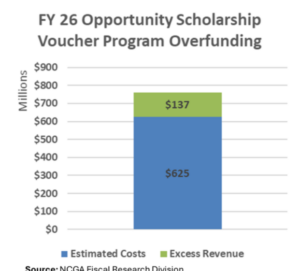Legislators: Want an easy budget cut? Look at overfunded Opportunity Scholarship voucher program
North Carolina’s state finances are facing a perfect storm.
First, tax revenue is failing to keep pace with our state’s needs. The General Assembly has slashed state taxes, largely to benefit corporations and wealthy North Carolinians. According to the North Carolina Budget and Tax Center, these regressive cuts are costing the state $12.5 billion this year, enough to increase General Fund spending by approximately 40 percent.
Second, the federal government is dramatically cutting the funding it provides North Carolina. North Carolina is projected to lose $420 million annually in food benefits and $39.9 billion in Medicaid funding over the next decade. These cuts would devastate families, veterans, and people returning home after incarceration.
Rep. Rieves has decried “the horrible fiscal condition that we’re in right now as a state.” Governor Stein has called on legislative budget writers “to be exceptionally conservative fiscally.”
In other words, legislative budget writers should be looking anywhere they can to find budget savings that won’t harm North Carolinians.
Luckily, one such option exists: Cut excess funding for Opportunity Scholarship vouchers.
According to data from the General Assembly’s nonpartisan Fiscal Research Division, the Opportunity Scholarship voucher program was overfunded by $137 million last year. They estimate that the program will be overfunded by a similar amount this coming year.

The Division’s budget experts estimate that demand for the voucher program – which hands out state money to disproportionately white and wealthy families with children in private schools – will increase more than 40 percent this year. Meanwhile, the program’s revenue is also set to increase and will exceed program costs by $137 million.
While $137 million isn’t enough to solve all of North Carolina’s fiscal woes, it’s hardly chump change. It’s enough to provide teachers with a 3.8 percent pay raise. It could put school nurses in more than 1,500 schools. Those types of investments materially benefit students.
Legislative budget writers are undoubtedly aware that the voucher program is dramatically overfunded. Yet cuts to the voucher program fail to appear in either of the Senate or House’s budget proposals. Certainly, lawmakers knowingly overfunding a private school voucher program for the benefit of the wealthy when our public schools have so many dire needs lends credence to the theory that legislative leaders are working to dismantle our public schools.
Of course, fiscal prudence isn’t the only reason why legislators should reduce the voucher program’s budget, if not eliminate the program completely.
Voucher programs are linked with an overwhelming list of negative outcomes, including:
- decreased academic results,
- reduced civil rights protections for students,
- exacerbation of racial and economic segregation,
- heightened budget pressures in our already underfunded public schools,
- passing on of education costs to families,
- transfer of wealth from working class families to the already wealthy,
- increased risk of fraud, and
- potential exposure of students to racist and anti-LGBTQ indoctrination and outright falsehoods by partisan or extreme religious groups.
For a state facing a fiscal crisis, eliminating private school voucher programs should be at the top of the list. Doing away with the wasteful program would free up a whopping $1.5 billion over the biennium.
Unfortunately, eliminating the voucher program and reinvesting in public schools remains out of the question so long as the current General Assembly leadership remains in place. The conservative majority views the negative outcomes of vouchers as features, rather than problems to be fixed. Their support for vouchers isn’t despite the way they harm student achievement, divide students across race and class, and enrich the wealthy – but because of these outcomes.
Current leadership should recognize, however, that dramatically overfunding the Opportunity Scholarship voucher fails to advance their agenda, particularly in times of fiscal crisis. NC legislators should take advantage of an easy win. Downsize this grossly overfunded program and put the $137 million in excess funding to productive use.
 Justice Circle
Justice Circle